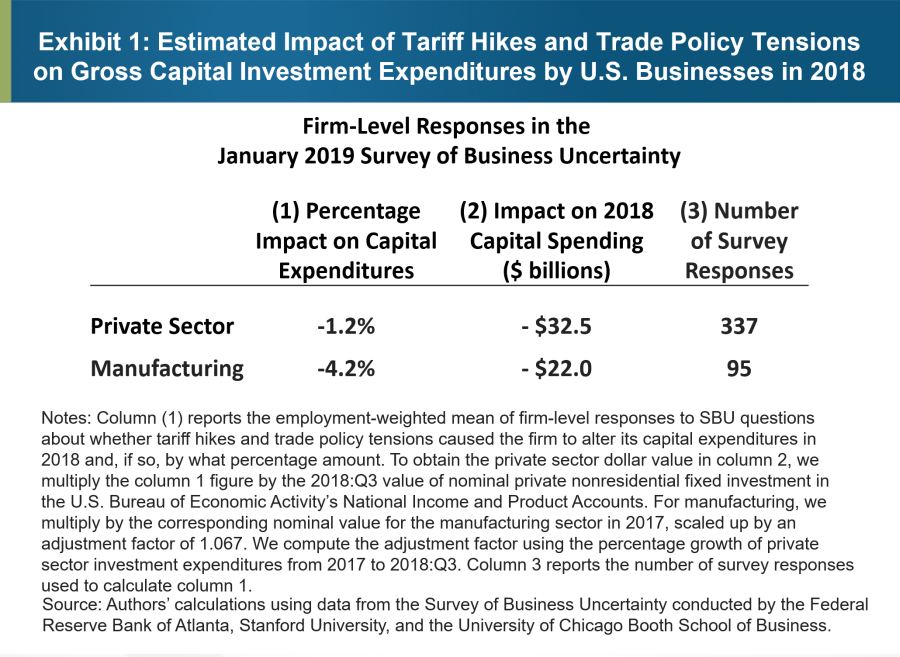Last summer, we reported that one fifth of firms in the July Survey of Business Uncertainty (SBU) were reassessing capital expenditure plans in light of then-recent tariff hikes and retaliation concerns. Roughly 6 percent had already cut or deferred capital spending as a result of tariff worries.
Since then, tariff hikes and trade policy tensions have continued to mount, as recounted in the Peterson Institute's Trade War Timeline. U.S. stock market volatility also rose sharply in the last four months of 2018, partly in reaction to trade policy concerns. These developments led us to pose another round of questions about trade policy and investment in the January 2019 SBU.
We first asked each firm if tariff hikes and trade policy tensions caused it to alter its capital expenditures in 2018 and, if so, in which direction and by how much. We use the responses to estimate the net impact of tariff hikes and trade policy tensions on U.S. business investment in 2018.
We estimate that tariff hikes and trade policy tensions lowered gross investment in 2018 by 1.2 percent in the U.S. private sector and by 4.2 percent in the manufacturing sector. The larger response for manufacturing makes sense, given its relatively high exposure to international trade. In constructing these estimates, we consider firms that raised and lowered investment due to trade policy, and we weight each firm by its size.
To estimate the dollar impact of trade policy developments, we multiply the percentage amounts by aggregate investment values. The resulting amounts for U.S. business investment in 2018—minus $32.5 billion for the private sector and minus $22 billion for manufacturing—are modest in magnitude, in line with our forward-looking assessment last summer.
In January, we also asked forward-looking questions about the potential impact of trade policy worries on business investment. As reported in Exhibit 2 below, 20 percent of firms said they are reassessing their capital expenditure plans in 2019 because of tariff hikes and trade policy tensions, a share very similar to what we obtained in our forward-looking question last July. As before, manufacturing firms were more likely to reassess their capital spending plans due to trade policy concerns.
Exhibit 3 below speaks to the question of how firms have reassessed their capital expenditure plans. Here, too, results are similar to what we reported last summer, with one important exception. Among firms reassessing, more than half have either postponed or dropped some portion of their capital spending for 2019, compared to just 31 percent in July 2018. Thus, it appears that firms anticipate somewhat larger negative effects of trade policy developments on capital expenditures in 2019 than they did in 2018.
All told, our results continue to suggest that tariff hikes and trade policy tensions have had a rather modest impact on U.S. business investment. Of course, tariffs and other trade barriers affect U.S. and foreign economies through multiple channels. Even if the near-term business investment effects of trade policy developments are modest in magnitude, trade barriers can disrupt supply chains, raise input prices, and lead to higher prices for consumer goods. That's important to keep in mind as the trade policy outlook remains murky.






 By David Altig, executive vice president and research director in the Atlanta Fed's Research Department,
By David Altig, executive vice president and research director in the Atlanta Fed's Research Department, Nick Bloom, the William D. Eberle Professor of Economics at Stanford University,
Nick Bloom, the William D. Eberle Professor of Economics at Stanford University, Steven J. Davis, the William H. Abbott Distinguished Service Professor of International Business and Economics at the Chicago Booth School of Business and Senior Fellow at the Hoover Institution,
Steven J. Davis, the William H. Abbott Distinguished Service Professor of International Business and Economics at the Chicago Booth School of Business and Senior Fellow at the Hoover Institution,  Brent Meyer, a policy adviser and economist in the Atlanta Fed's Research Department, and
Brent Meyer, a policy adviser and economist in the Atlanta Fed's Research Department, and  Nick Parker, the Atlanta Fed's director of surveys.
Nick Parker, the Atlanta Fed's director of surveys.